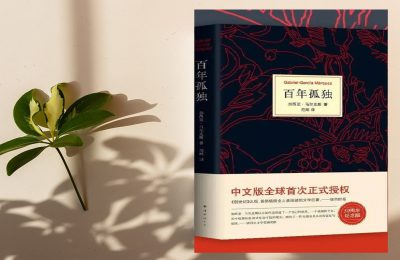《百年孤独》,是哥伦比亚作家加西亚·马尔克斯创作的长篇小说,是其代表作,也是拉丁美洲魔幻现实主义文学的代表作,被誉为“再现拉丁美洲历史社会图景的鸿篇巨著”。故事讲述马孔多小镇和布恩地亚家族的兴衰变化与传奇故事,记录了家族命运与百年历史,是重复地叙述相同而荒唐的命运,是拉美国家几百年命运的缩影,独具意味地隐喻着人类“文明”史的建立、发展与终结,在荒凉失落与荒唐可笑中诠释宿命式的轮回。家族中人物名字是相同或相近的,预示着他们拥有殊途同归的孤独命运。《百年孤独》以布恩地亚被捆在树上为开端,以他被蚂蚁吃掉为结束,通过细腻丰富的笔触、大胆自由的想象、魔幻的叙事艺术,讲述布恩地亚家族命运与历史,刻画人物孤独的灵魂与自我救赎,进而体现出个人、家族及全人类的悲悯与孤独情怀,让人们重新思考时代发展与人性变化。《百年孤独》被世界文坛誉为魔幻现实主义文学的主峰,已被翻译成30多种文字出版,销量逾1000万册。
Chapter 13
IN THE BEWILDERMENT of her last years, ?rsula had had very little free time to attend to the papal education of Jos?Arcadio, and the time came for him to get ready to leave for the seminary right away. Meme, his sister, dividing her time between Fernanda’s rigidity and Amaranta’s bitterness, at almost the same moment reached the age set for her to be sent to the nuns?school, where they would make a virtuoso on the clavichord of her. ?rsula felt tormented by grave doubts concerning the effectiveness of the methods with which she had molded the spirit of the languid apprentice Supreme Pontiff, but she did not put the blame on her staggering old age or the dark clouds that barely permitted her to make out the shape of things, but on something that she herself could not really define and that she conceived confusedly as a progressive breakdown of time. “The years nowadays don’t pass the way the old ones used to,?she would say, feeling that everyday reality was slipping through her hands. In the past, she thought, children took a long time to grow up. All one had to do was remember all the time needed for Jos?Arcadio, the elder, to go away with the gypsies and all that happened before he came back painted like a snake and talking like an astronomer, and the things that happened in the house before Amaranta and Arcadio forgot the language of the Indians and learned Spanish. One had to see only the days of sun and dew that poor Jos?Arcadio Buendía went through under the chestnut tree and all the time weeded to mourn his death before they brought in a dying Colonel Aureliano Buendía, who after so much war and so much suffering from it was still not fifty years of age. In other times, after spending the whole day making candy animals, she had more than enough time for the children, to see from the whites of their eyes that they needed a dose of castor oil. Now, however, when she had nothing to do and would go about with Jos?Arcadio riding on her hip from dawn to dusk, this bad kind of time compelled her to leave things half done. The truth was that ?rsula resisted growing old even when she had already lost count of her age and she was a bother on all sides as she tried to meddle in everything and as she annoyed strangers with her questions as to whether they had left a plaster Saint Joseph to be kept until the rains were over during the days of the war. No one knew exactly when she had begun to lose her sight. Even in her later years, when she could no longer get out of bed, it seemed that she was simply defeated by decrepitude, but no one discovered that she was blind. She had noticed it before the birth of Jos?Arcadio. At first she thought it was a matter of a passing debility and she secretly took marrow syrup and put honey on her eyes, but quite soon she began to realize that she was irrevocably sinking into the darkness, to a point where she never had a clear notion of the invention of the electric light, for when they put in the first bulbs she was only able to perceive the glow. She did not tell anyone about it because it would have been a public recognition of her uselessness. She concentrated on a silent schooling in the distances of things and peoples voices, so that she would still be able to see with her memory what the shadows of her cataracts no longer allowed her to. Later on she was to discover the unforeseen help of odors, which were defined in the shadows with a strength that was much more convincing than that of bulk and color, and which saved her finally from the shame of admitting defeat. In the darkness of the room she was able to thread a needle and sew a buttonhole and she knew when the milk was about to boil. She knew with so much certainty the location of everything that she herself forgot that she was blind at times. On one occasion Fernanda had the whole house upset because she had lost her wedding ring, and ?rsula found it on a shelf in the children’s bedroom. Quite simply, while the others were going carelessly all about, she watched them with her four senses so that they never took her by surprise, and after some time she discovered that every member of the family, without realizing it, repeated the same path every day, the same actions, and almost repeated the same words at the same hour. Only when they deviated from meticulous routine did they run the risk of losing something. So when she heard Fernanda all upset be cause she had lost her ring, ?rsula remembered that the only thing different that she had done that day was to put the mattresses out in the sun because Meme had found a bedbug the might before. Since the children had been present at the fumigation, ?rsula figured that Fernanda had put the ring in the only place where they could not reach it: the shelf. Fernanda, on the other hand, looked for it in vain along the paths of her everyday itinerary without knowing that the search for lost things is hindered by routine habits and that is why it is so difficult to find them.
-1.gif)




